Change these pickled eggplant eating habits now, and your body will thank you greatly.
Harmful Ways of Eating Pickled Eggplant
Pickled eggplant is a rustic dish beloved by the Vietnamese. However, improper consumption can lead to health issues. Experts evaluate that certain ways of eating pickled eggplant can cause food poisoning and even cancer.
Overview of Eggplant
According to Traditional Chinese Medicine, eggplant is sweet, cool in nature, and has effects such as blood circulation, anti-inflammatory properties, pain relief, laxative effects, diuretic benefits, treatment for swelling due to toxins, and cough remedies.
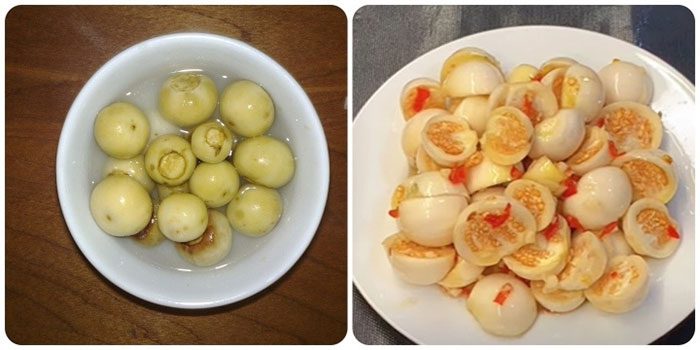
Eggplant is a favorite dish for many. (Photo: VTC).
In Traditional Chinese Medicine, eggplant is referred to as di tử or giả tử, ải qua, and in colloquial terms, it is known as cà ghém, cà pháo, cà muối.
Eggplant, scientifically known as Solanum torum, is a small plant with deeply lobed leaves and spines. It has white flowers and fruit that turns yellow when ripe. The entire plant can be used medicinally.
Eggplant is commonly used to treat pain in the lower back, injuries from falls, stomach pain, toothaches, menstrual irregularities, and chronic coughs. The recommended dosage is 10-15 grams of roots in decoction.
100 grams of eggplant provides 1.5 grams of protein (including all essential amino acids), 12 mg of calcium, 0.7 mg of iron, 18 mg of magnesium, 16 mg of phosphorus, 22.1 mg of potassium, and 0.3 mg of zinc. Additionally, eggplant contains copper and selenium, which are valuable trace minerals.
It also includes several vitamins such as provitamin A, vitamin C, and vitamins B1, B2, and PP. However, the seeds of the eggplant contain fine hairs that may cause coughing. No studies have yet published about the harmful effects. The amount of sitosterol is negligible, but it contains toxic solanine. Unripe eggplants contain more solanine than ripe ones.
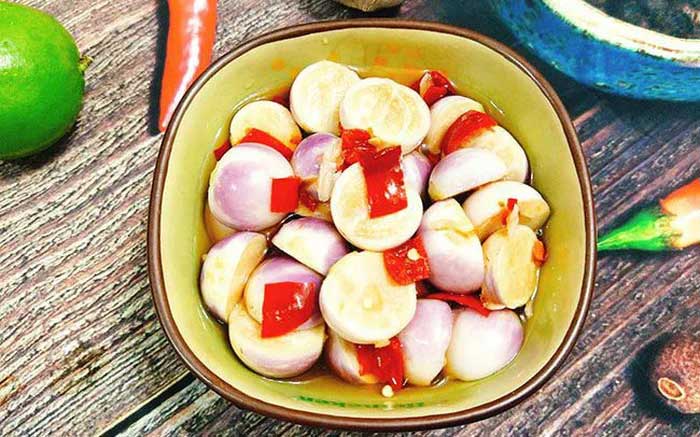
Pickled eggplant that has not been fermented enough contains the toxin solanine.
1. Eating Pickled Eggplant That Has Not Been Fermented Enough
According to Associate Professor Dr. Nguyễn Duy Thịnh (former lecturer at the Institute of Food Science and Technology, Hanoi University of Science and Technology), pickled eggplant that has not been fermented enough contains the toxin solanine. Especially in eggplants with green skins, the solanine content can be 10-15 times higher than the safe level for human consumption.
This substance is found in green parts of potatoes as well. Even a small amount of solanine can cause poisoning.
In summer, many people have a habit of pickling eggplant quickly, sometimes just a few hours before eating. Eating quickly pickled eggplant with rice is refreshing during the hot summer. However, experts warn that this method does not ensure proper fermentation. In fact, the eggplant may still be raw, making the risk of solanine poisoning unavoidable.
2. Eating Eggplant Pickled in Plastic Containers That Previously Held Paint
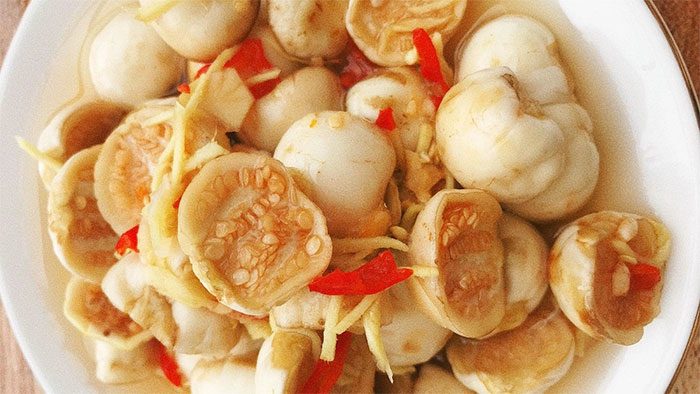
Pickled eggplant in paint containers is very dangerous for health.
Associate Professor Dr. Nguyễn Duy Thịnh states that pickled eggplant in paint containers is very dangerous for health and can even cause cancer.
Experts share that most paint containers are made from polymer plastics that could leach harmful substances into food. During manufacturing, these molecules may remain and dissolve in water.
Thus, when we pickle eggplant, these substances can dissolve into the brine, subsequently absorbed by the eggplant, entering the bloodstream and cells through consumption, potentially leading to cancer over time.
Moreover, any remaining additives or colorants in paint containers can also poison the body when consuming pickled eggplant, leading to chronic poisoning that can develop into cancer.
This scenario can easily occur if you do not pickle eggplant at home. Buying pickled eggplant from markets often involves large containers due to high demand, increasing the risk of illness.
3. Eating Overly Salty Pickled Eggplant
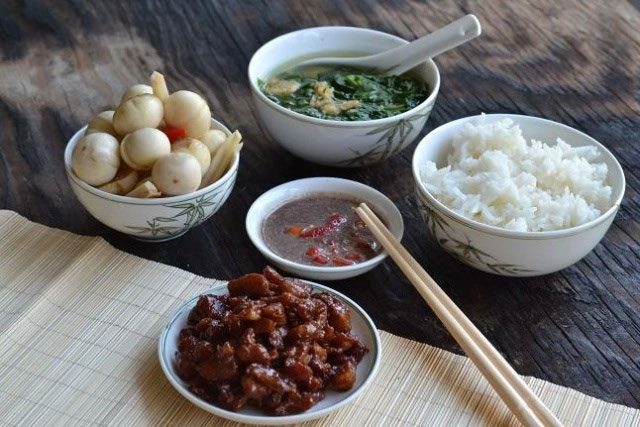
Overly salty pickled eggplant increases the risk of chronic diseases.
Many people find salty pickled eggplant delicious and pair it well with rice. As a result, many people add a lot of salt when pickling eggplant. However, this habit is detrimental to health, producing highly toxic substances that can lead to cancer.
According to investigation data from the Ministry of Health, on average, each Vietnamese person consumes 2-3 times the recommended salt intake of 5g/day.
Notably, in recent years, the salty eating habit of Vietnamese people has led to severe consequences. The World Health Organization (WHO) estimated that in 2017, over 541,000 Vietnamese died, with non-communicable diseases accounting for 76%, including cardiovascular diseases, diabetes, cancer, osteoporosis, and gout… especially stomach cancer.
It is not an exaggeration to say that on Vietnamese dining tables, dishes like overly salty pickled eggplant significantly increase the risk of chronic diseases.
4. Eating Pickled Eggplant That Has Developed Yellow or Black Scum
Pickled eggplant that has been stored for a long time indicates it has soured, resulting in scum formation. However, if the scum turns yellow or black, it is best to discard it. The change in color indicates that the pickled eggplant has been contaminated with mold, which can lead to cancer if consumed over time.
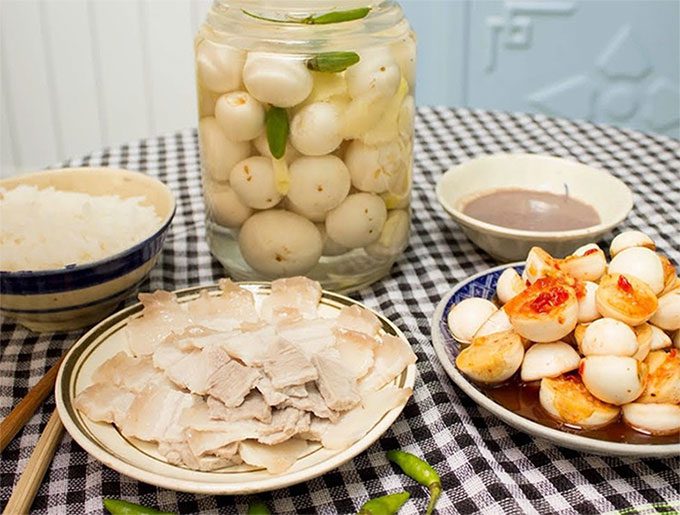
Before pickling eggplant, wash the ingredients and utensils thoroughly.
Nonetheless, many people believe that pickled eggplant is still delicious if they simply wash away the scum before serving. In reality, mold can penetrate each piece of eggplant. Washing only addresses the visible outer layer.
Speaking about eggplant, Traditional Medicine physician Bùi Đắc Sáng from the Vietnam Academy of Science and Technology, Hanoi Traditional Medicine Association, states that green eggplants contain the toxin solanine at a dosage of 2-5 mg/kg body weight, which can cause poisoning symptoms. A dosage of 4-6 mg/kg body weight can be life-threatening.
Symptoms of solanine poisoning typically appear 8-12 hours after consuming contaminated food but can occur within 30 minutes if consuming food with high solanine levels.
“Currently, in some places, people still eat quickly pickled green eggplants. This practice is unsafe and can be harmful. Quickly pickled eggplant has not been fermented enough, making it prone to poisoning,” Mr. Sáng said.
What should you follow when eating pickled eggplant to avoid causing illness for the whole family?
- Pickled eggplant should be made in ceramic or stone jars without flashy decorations or colors.
- Plastic containers made from white, durable, flexible PVC can be used for pickling, ensuring safety.
- Before pickling, wash the ingredients and utensils thoroughly.
- Create a good fermentation environment and maintain hygiene during the pickling process.
- If the eggplant still has an unpleasant taste when taken out to eat, stop and do not consume more.
- Do not eat pickled eggplant that has yellow or black scum.
- Avoid eating quickly pickled eggplant or using it as a dip with shrimp paste.
Eating a lot of pickled eggplant and pickles can increase cancer risk?
Do not eat quickly pickled eggplant and pickles
China has an impenetrable underwater tomb, even Qin Shi Huang had to “give up” and return



















































